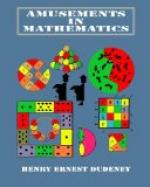The merchant told one of his men to distribute the contents of any basket he chose among some children, giving plums to every child so that each should receive an equal number. But the man found it quite impossible, no matter which basket he selected and no matter how many children he included in the treat. Show, by giving contents of the nine baskets, how this could come about.
410.—THE MANDARIN’S “T” PUZZLE.
[Illustration]
Before Mr. Beauchamp Cholmondely Marjoribanks set out on his tour in the Far East, he prided himself on his knowledge of magic squares, a subject that he had made his special hobby; but he soon discovered that he had never really touched more than the fringe of the subject, and that the wily Chinee could beat him easily. I present a little problem that one learned mandarin propounded to our traveller, as depicted on the last page.
The Chinaman, after remarking that the construction of the ordinary magic square of twenty-five cells is “too velly muchee easy,” asked our countryman so to place the numbers 1 to 25 in the square that every column, every row, and each of the two diagonals should add up 65, with only prime numbers on the shaded “T.” Of course the prime numbers available are 1, 2, 3, 5, 7, 11, 13, 17, 19, and 23, so you are at liberty to select any nine of these that will serve your purpose. Can you construct this curious little magic square?
411.—A MAGIC SQUARE OF COMPOSITES.
As we have just discussed the construction of magic squares with prime numbers, the following forms an interesting companion problem. Make a magic square with nine consecutive composite numbers—the smallest possible.
412.—THE MAGIC KNIGHT’S TOUR.
Here is a problem that has never yet been solved, nor has its impossibility been demonstrated. Play the knight once to every square of the chessboard in a complete tour, numbering the squares in the order visited, so that when completed the square shall be “magic,” adding up to 260 in every column, every row, and each of the two long diagonals. I shall give the best answer that I have been able to obtain, in which there is a slight error in the diagonals alone. Can a perfect solution be found? I am convinced that it cannot, but it is only a “pious opinion.”
MAZES AND HOW TO THREAD THEM.
“In wandering mazes lost.”
Paradise Lost.
The Old English word “maze,” signifying a labyrinth, probably comes from the Scandinavian, but its origin is somewhat uncertain. The late Professor Skeat thought that the substantive was derived from the verb, and as in old times to be mazed or amazed was to be “lost in thought,” the transition to a maze in whose tortuous windings we are lost is natural and easy.




